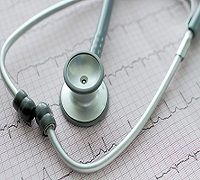Low-Dose Edoxaban Reduces Stroke, Systemic Embolism Incidence in Elderly with AF
Regardless of frailty status, edoxaban 15 mg was associated with significantly reduced incidence of the study outcomes compared with placebo.

In new findings, once-daily, low-dose edoxaban (15 mg) was associated with reduced incidence of stroke or systemic embolism in elderly patients with atrial fibrillation (AF) compared with placebo.
The risks of stroke or systemic embolism and major bleeding were not statistically different between nonfrail and frail patients, although the incidence of death was higher in frail patients, according to the data.
“There was no significant interaction between frail and nonfrail status; therefore, the 15-mg dose of edoxaban used in the present study showed consistent association of edoxaban with reduced stroke or systemic embolism independently of frailty status,” wrote study author Shintaro Akashi, MD, PhD, Division of Cardiology, National Hospital Organization Hamada Medical Center.
Being more common in frail patients, the prevalence of AF increases with age and clinical guidelines recommend the use of direct oral anticoagulants (DOACs) even in elderly and frail patients. Although benefits of DOAC treatment seemingly outweigh risk associated with frailty, there is a lack of evidence on the use of DOACs in very elderly patients with AF and frailty.
The ELDERCARE-AF (Edoxaban Low-Dose for Elder Care Atrial Fibrillation Patients) trial compared the efficacy and safety of very-low-dose edoxaban (15 mg) versus placebo in very elderly Japanese patients (aged ≥80 years). These patients were considered ineligible for standard oral anticoagulant therapy (OAC) due to high bleeding risk.
The current subanalysis took place from August 2016 to November 2019, with the last person followed up in late December 2019. Its primary efficacy endpoint was the composite of stroke or systemic embolism and the primary safety endpoint was major bleeding.
Very low-dose edoxaban was associated with lower incidence of stroke or systemic embolism consistently across frailty in a cohort of 944 patients randomly assigned to treatment .
Investigators determined frailty status in 474 patients in the edoxaban group (289 non frail patients [61.0%]; 185 frail patients [39.0%]) and 470 patients in the placebo group (253 non frail patients [53.8%]; 217 frail patients [46.2%]).
In the placebo group, data show the estimated event rates for stroke or systemic embolism were 7.1% (1.6%) per patient-year in the frail group and 6.1% (1.3%) per patient-year in the nonfrail group
The edoxaban group experienced stroke or systemic embolism at an estimated event rate of 2.5% (1.0%) of the frail patients and 1.5% (0.6%) of the nonfrail patients (adjusted hazard ratio [HR], 1.41; 95% CI, 0.44 - 4.49; adjusted P = .56).
When investigators compared edoxaban with placebo, the edoxaban group consistently had fewer stroke or systemic embolism events regardless of frailty status with no heterogeneity between the groups.
The placebo group experienced major bleeding in 2.3% in the frail group and 1.5% in the nonfrail group (adjusted HR, 1.48; 95% CI, 0.47 - 4.63; adjusted P = .51). The edoxaban group saw major bleeding occur in 3.7% in the frail group and 2.9% in the nonfrail group (adjusted HR, 1.04; 95% CI, 0.39 - 2.77; adjusted P = .94).
Investigators noted there was no interaction with frailty status or assessment parameters in the association of edoxaban with major bleeding.
The study, “Outcomes and Safety of Very-Low-Dose Edoxaban in Frail Patients with Atrial Fibrillation in the ELDERCARE-AF Randomized Clinical Trial,” was published in JAMA Network Open.